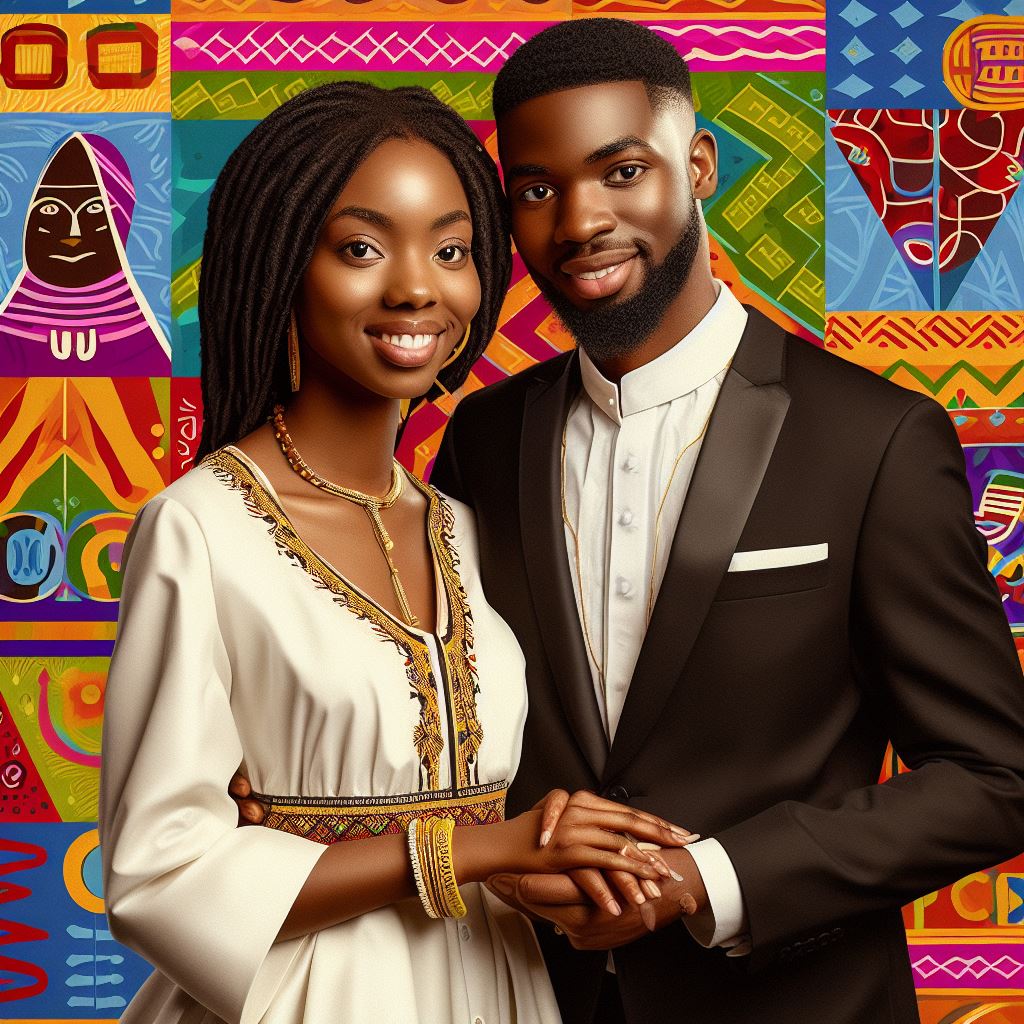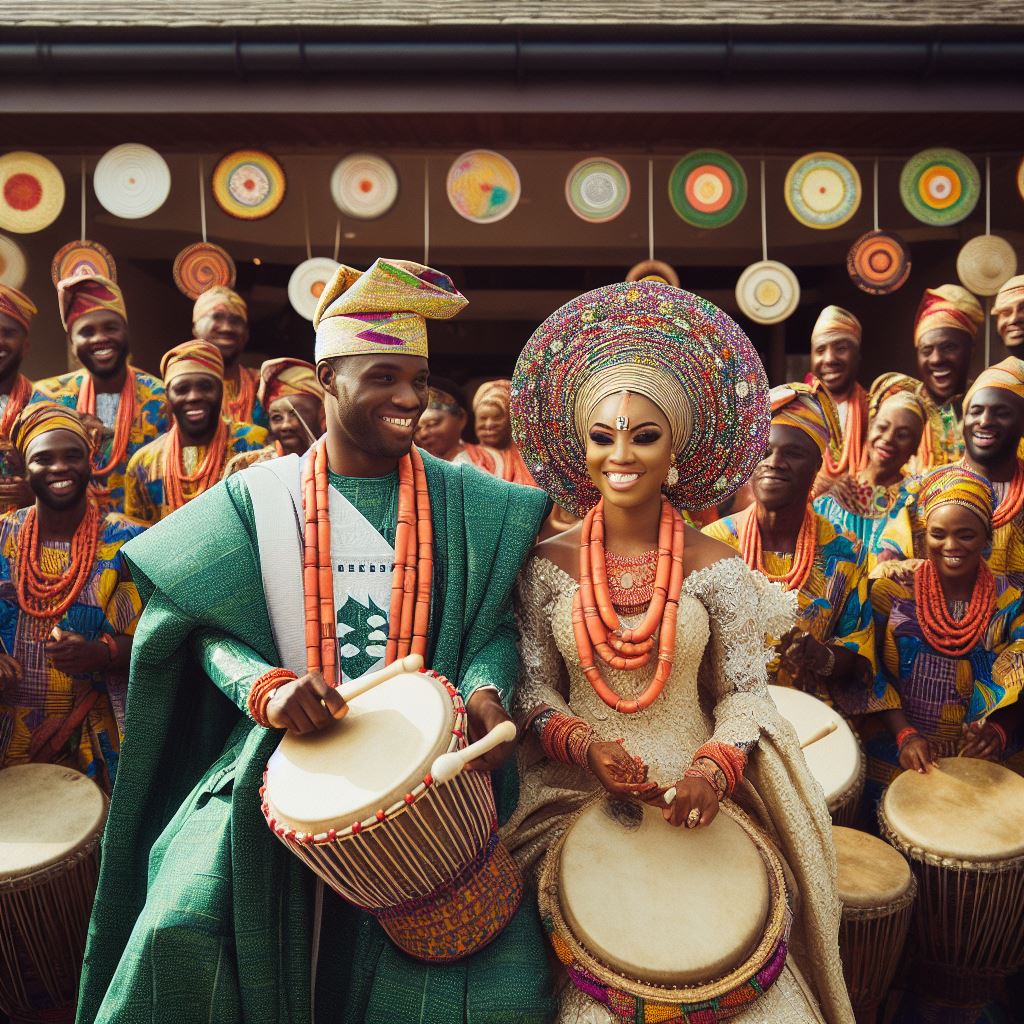Introduction
Picture a nation where faith and culture converge in a vibrant tapestry, Nigeria, a land of diversity and dynamism.
Christian marriages in Nigeria are a reflection of this rich tapestry, where age-old traditions harmonize with modern beliefs and practices.
These unions are not only a union of two individuals but a merging of deeply rooted customs and religious principles.
In this section, we embark on an illuminating journey to explore the multifaceted dynamics of Christian marriages in contemporary Nigeria.
We will delve into the interplay between faith, tradition, and modernity, seeking to understand the unique challenges and joys that these unions bring to couples in this culturally diverse nation.
By the end of this exploration, you will gain a deeper insight into the fascinating world of Christian marriages in Nigeria.
Historical Background of Christian Marriages in Nigeria
Early influence of traditional marriage values
In the early years, traditional marriage values played a significant role in Christian marriages in Nigeria.
Introduction of Christianity and its impact on marriage dynamics
With the arrival of Christianity, there was a shift in the dynamics of Christian marriages in Nigeria.
Christianity brought new expectations and practices that influenced the way marriages were conducted.
The influence of Christianity led to a fusion of traditional African customs with Christian beliefs.
This fusion resulted in a unique form of Christian marriages that incorporated both traditional and Christian values.
Shifts in societal perceptions and norms
Over time, Nigerian society experienced shifts in perceptions and norms that impacted Christian marriages.
Traditional marriage practices began to give way to more modern and Westernized ideas of marriage.
As education and exposure to different cultures increased, the traditional roles of men and women in marriages changed.
Christian marriages in Nigeria started to reflect a more egalitarian approach between spouses.
Women gained more independence and autonomy within their marital relationships.
These shifts also brought about changes in marital expectations, communication patterns, and decision-making processes.
Marriages became more of a partnership, where both spouses worked together for the success of their union.
Despite these changes, the influence of traditional values and cultural practices still held significant importance in Christian marriages.
Therefore, the historical background of Christian marriages in Nigeria showcases the blend of traditional values and Christian beliefs that have shaped the dynamics of these unions over time.
Christian Marriage Principles and Beliefs
Importance of faith and spirituality in Christian marriages
Christian marriages in contemporary Nigeria are deeply rooted in faith and spirituality. The importance of these elements cannot be overemphasized.
Christian couples recognize that their relationship with God plays a vital role in the success of their marriage. They strive to build a union founded on religious principles and beliefs.
Role of the Bible as a guide for marital relationships
The Bible holds tremendous significance in Christian marriages. It serves as a guidebook and source of wisdom for couples navigating the complexities of marital relationships.
Christian spouses rely on scripture to seek guidance when faced with challenges, conflicts, or decisions in their marriage.
They understand that following biblical teachings is essential for a harmonious and fulfilling union.
Love, respect, and commitment
Love, respect, and commitment are at the core of Christian marriages in Nigeria. Couples are encouraged to love each other unconditionally, just as God loves them.
They strive to maintain a deep connection and affection for one another, prioritizing their partner’s happiness and well-being.
Moreover, mutual respect is emphasized, encompassing recognition, appreciation, and honoring each other’s roles within the marriage.
Commitment is a fundamental aspect of Christian marriages. Couples enter into a covenant with God and each other, promising to remain faithful and loyal through all circumstances.
This commitment extends beyond the initial vows taken during the wedding ceremony. It involves a daily choice to invest in the relationship, nurture it, and overcome any obstacles that may arise.
In Christian marriages, faith and spirituality provide a strong foundation for couples to weather the storms of life together.
They believe that their shared belief in God strengthens their bond, allowing them to face challenges with resilience and hope.
Christian spouses often engage in spiritual practices together, such as prayer, worship, and studying the Bible. These activities foster a deeper connection and intimacy within the marital relationship.
The influence of Christian marriage principles and beliefs goes beyond the relationship between the spouses. It extends to the broader community and society as well.
Christian couples strive to be a testament to their faith, demonstrating the transformative power of love and commitment.
Their marital example serves as an inspiration for others and an invitation to embrace the values that underpin Christian marriages.
The dynamics of Christian marriages in contemporary Nigeria are deeply influenced by faith, spirituality, and biblical teachings.
Love, respect, and commitment form the cornerstone of these marriages, resulting in resilient and fulfilling unions.
Christian couples understand that their relationship is not solely about their personal happiness but also about glorifying God and being a positive influence in their communities.
Read: The Role of Husbands & Wives: Exploring Ephesians 5
Gender Roles and Expectations
Traditional gender roles in Nigerian society
- Men are expected to be the breadwinners and provide for their families.
- Women are often assigned domestic duties such as cooking, cleaning, and child-rearing.
- These roles are deeply ingrained in traditional Nigerian culture and upheld by societal norms.
Changing dynamics in contemporary Christian marriages
- Christian marriages are influenced by the teachings of equality and mutual respect.
- Couples are challenging traditional gender roles and adopting more balanced responsibilities.
- Both partners are encouraged to contribute financially and participate in household chores.
- Women are pursuing careers and higher education, shifting the power dynamics within marriage.
Role of equality and mutual respect
- Christian teachings emphasize that both men and women are equal in the eyes of God.
- Mutual respect between spouses leads to healthier and more fulfilling relationships.
- Couples who embrace equality are better equipped to handle challenges and make joint decisions.
- Shared responsibilities promote teamwork and foster a stronger bond between partners.
- Equality allows each partner to express their unique talents, leading to personal growth and development.
Gender roles and expectations in Christian marriages have evolved in contemporary Nigeria.
While traditional norms still influence Nigerian society, Christian couples are challenging these roles and embracing equality.
The shift towards shared responsibilities, mutual respect, and recognizing each other’s worth fosters healthier and more fulfilling marriages.
Embracing equality not only strengthens the bond between partners but also allows each individual to grow and flourish within the marriage.
Read: Navigating Marital Challenges: Guidance from the Bible
Challenges and Issues Faced by Christian Marriages
Influence of external factors (socio-economic, cultural, etc.)
- The socio-economic factors can put a strain on Christian marriages in Nigeria.
- Economic instability leads to financial stress, affecting the overall stability of marriages.
- Cultural differences and expectations can create conflicts and misunderstandings between spouses.
- The influence of extended family members can also pose challenges in Christian marriages.
- Pressure from society to conform to certain norms and expectations may create tension in relationships.
Communication and conflict resolution challenges
- Poor communication often leads to misunderstandings and unresolved conflicts in Christian marriages.
- The inability to effectively express needs and emotions can create barriers between spouses.
- Language and cultural barriers may also affect communication, particularly in inter-tribal marriages.
- A lack of conflict resolution skills can lead to unresolved issues and resentment within the marriage.
- Unhealthy arguments and unresolved conflicts can erode trust and intimacy between spouses.
Balancing spiritual and marital responsibilities
- Christian couples often grapple with finding a balance between their spiritual and marital responsibilities.
- The demands of church activities and obligations can sometimes take precedence over spousal duties.
- Neglecting marital responsibilities in favor of spiritual commitments can strain the relationship.
- Expectations of being a “perfect” Christian can lead to unrealistic pressure on individuals and their spouses.
- Finding a balance requires open communication, compromise, and prioritizing the needs of the marriage.
Christian marriages in contemporary Nigeria face various challenges and issues. External factors like socio-economic conditions and cultural expectations can affect the stability of marriages.
Poor communication and conflict resolution skills can lead to misunderstandings and unresolved conflicts.
Finding a balance between spiritual and marital responsibilities can also pose challenges in Christian marriages.
However, with open communication, commitment, and a willingness to address these challenges, Christian couples can overcome these issues and strengthen their marital bond.
Read: A Lifelong Bond: Inspirational Bible Verses on Marriage
Gain More Insights: Marriage Wishes Etiquette: Do’s and Don’ts in Nigeria
Learn More: Igbo Marriage Wishes: A Blend of Culture & Love
Support Systems for Christian Marriages
Role of the church and religious leaders
- The church plays a crucial role in providing guidance and support to married couples.
- Religious leaders act as counselors and mentors, helping couples navigate challenges and strengthen their relationship.
- Churches offer marriage seminars, workshops, and conferences to equip couples with necessary skills for a successful marriage.
- Through regular worship and fellowship, the church creates a sense of community that supports and encourages married couples.
- Religious leaders provide spiritual guidance and a foundation for marital values, emphasizing commitment, love, and forgiveness.
Importance of pre-marital counseling and marriage enrichment programs
- Pre-marital counseling prepares engaged couples for the realities and challenges of married life.
- Couples learn effective communication, conflict resolution, and problem-solving skills during pre-marital counseling.
- These programs equip couples with tools to build a strong foundation and prevent potential conflicts.
- Marriage enrichment programs focus on enhancing the intimate bond between spouses and reigniting passion.
- By addressing common issues such as finances, parenting, and intimacy, couples can strengthen their marriage.
Role of family and community support
- Family support is crucial for Christian marriages as it provides a strong and nurturing environment.
- Parents can offer guidance based on their own marital experiences, imparting wisdom and advice.
- Extended family members can serve as role models and sources of support during challenging times.
- Strong community support provides a sense of belonging and assurance that couples are not alone.
- Friends, neighbors, and church members can offer encouragement, advice, and practical help when needed.
Support systems are essential for the success of Christian marriages in contemporary Nigeria.
The church and religious leaders play a vital role in guiding couples, providing resources, and fostering a sense of community.
Pre-marital counseling and marriage enrichment programs equip couples with necessary skills to navigate challenges and strengthen their bond.
Family and community support offer guidance, role models, and a network of encouragement.
These support systems create a solid foundation for Christian marriages, ensuring long-lasting and fulfilling relationships.
Read: Commitment and Marriage: Bible Verses to Live By

Success Stories and Inspirations
Examples of thriving Christian marriages in Nigeria
- Mr. and Mrs. Adekunle: A couple who have been married for 25 years and still deeply in love.
- Pastor Samuel and Mrs. Esther: A ministry power couple who balance their work and family life flawlessly.
- Dr. Yemi and Mrs. Funmi: An accomplished couple who have achieved their dreams while maintaining a strong marriage.
Testimonies of overcoming challenges and achieving marital bliss
- Mr. and Mrs. Okon: Despite financial hardships, they built a successful business together and created a happy home.
- Mr. and Mrs. Abdullahi: They faced cultural differences and family opposition, but their love triumphed, resulting in a blissful marriage.
- Mr. and Mrs. Johnson: After the loss of their child, they navigated the grieving process together, finding healing and renewed love.
Lessons learned from successful couples
- Communication is key: Successful couples prioritize open and honest communication to understand each other’s needs and resolve conflicts.
- Mutual respect and support: Thriving Christian marriages in Nigeria are characterized by mutual respect and support for each other’s dreams and goals.
- Spirituality as the foundation: Couples who place their faith in God and prioritize spiritual growth together experience a deeper connection.
- Patience and forgiveness: Successful couples understand the importance of patience and forgiveness in sustaining a harmonious and loving marriage.
- Continual learning and growth: They actively seek knowledge and acquire skills that enhance their relationship, such as attending marriage seminars or counseling.
- Quality time and intimacy: Successful couples make intentional efforts to spend quality time together and nurture emotional and physical intimacy.
- Teamwork and shared responsibilities: Sharing household chores and responsibilities promotes a sense of partnership and strengthens the bond between spouses.
- Regular date nights and romantic gestures: Couples prioritize nurturing their romance by planning regular date nights and surprising each other with gestures of love.
- Gratitude and appreciation: Expressing gratitude and regularly appreciating each other’s efforts and qualities foster a positive and fulfilling marital bond.
- Weathering storms together: Successful couples stick to their marriage vows during challenging times, supporting and encouraging each other through thick and thin.
By sharing these success stories and lessons learned, we hope to inspire and encourage Christian couples in Nigeria to create strong and thriving marriages, guided by their faith and love for each other.
Conclusion
Recap of key points discussed
In this section, we delved into the intricate dynamics of Christian marriages in contemporary Nigeria. We explored the role of faith, culture, and tradition in shaping these unions.
Communication, mutual respect, and adaptability emerged as vital ingredients for a successful Christian marriage.
Importance of understanding the dynamics of Christian marriages in Nigeria
Understanding these dynamics is crucial not only for couples but also for the broader society. It fosters empathy and tolerance, promoting harmony among diverse religious and cultural backgrounds.
Moreover, it empowers couples to navigate the challenges and complexities of marriage while staying true to their Christian values.
Call to action or reflection question for readers
As we conclude, consider this: How can you contribute to the strength and resilience of Christian marriages in Nigeria, and what role can understanding these dynamics play in your own relationships?
Intricately woven into the fabric of Nigerian society, Christian marriages continue to evolve, offering valuable lessons for us all.




